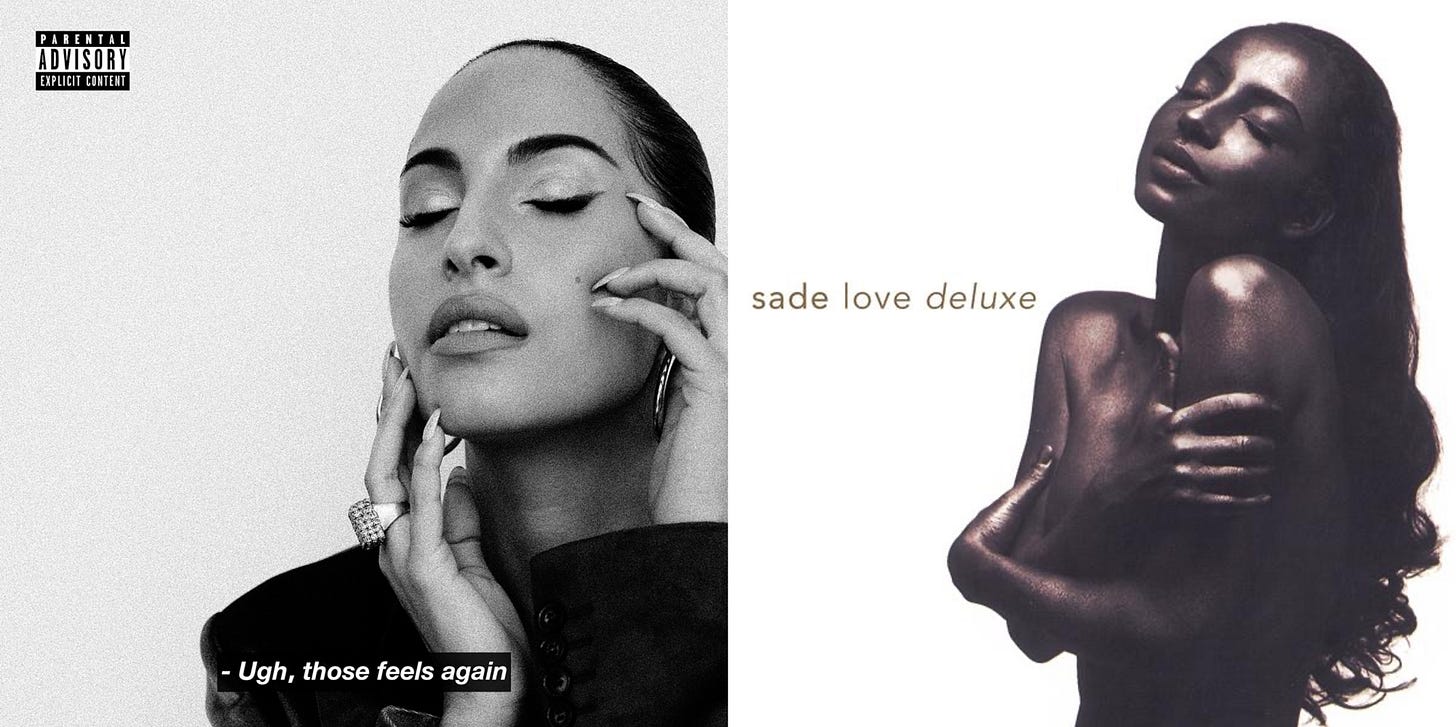Album Review: Snoh Aalegra 'Temporary Highs in the Violet Skies'
Snoh Aalegra often sings under a cloud of melancholy: the Swedish-born-and-raised, Los Angeles-based Iranian songstress has quietly cultivated a following for her moody, sensual R&B. Her soulful, contemplative singing has pulled the audience into her world by offering a glimpse of what’s on her mind. ‘I’ve always been very emo since I was a little kid.’ She once told in an interview. The emotions of being in and out of love have always been a theme in her music. With the third studio album Temporary Highs in the Violet Skies, the colour scheme of her emotions becomes fuller and more vivid, culminating in her most captivating work to date.
Snoh’s reliance on an elusive sensibility used to leave the impression that, what fuels her previous work, aptly titled FEELS and - Ugh, those feels again, is no more than mere strands of feels that easily slip through the fingertips. On the lead single of - Ugh, ‘I Want You Around’, she once declared ‘I don’t wanna kiss you yet. I just wanna feel you’. Those feels sometimes get sketched out in the artwork. Take the album cover for instance, it features a black and white grainy visage of Snoh, slightly off-centre with her fingers lingering over her face and eyes heaving shut. Down in the middle is the album title, in off-white Helvetica Italic against a sable block, mimicking a line of movie subtitles. It references the singer’s self-designated style label, ‘cinematic soul’. The entire imagery cannot help but conjure up Sade’s aesthetics especially embodied on the Love Deluxe cover, from the colour scheme and composition, to the slick back hair, the chunky hoop earrings, and the posture. Interestingly, Snoh has never brought up Sade’s name when asked who her music heroes are. She has cited many a legend, including Michael Jackson, Stevie Wonder, Whitney Houston, Janet Jackson, and her mentor for three years before passing away, Prince. Somehow the Snoh/Sade comparison made its way into a Twitter debate when Temporary Highs was freshly released, prompting Snoh herself to clear the air by outright dismissing it. The underlying troublesome political implication aside, i.e., Snoh’s adjacency to diasporic music as a non-African person but almost passing by racial ambiguities, Sade has been one piece of Snoh’s mood board, at least visually. Musically, however, the tendency for her writing and performance to dissolve and dissipate into the wallpaper has been a deflating snag at times. Underneath the photogenic exterior, there has been a mystery or aloofness in her artistic expression, perhaps out of a need for self-preservation. Will the real ‘Snoh’, or rather less curated ‘Snoh’ stand up, please?
Temporary Highs attempts to offer a resolution. Production-wise, it marks a prominent expansion of the elasticity to her full-length effort, finding her singing against more free-swinging beats. Among some of the first-time collaborators on the album, the Neptunes injects their animated funk into the tissues of mid-tempo tapestry that’s no doubt Snoh’s forte. (Such a shame that the resurgence of the production duo is so short-lived, at least for now as Chad Hugo took Pharrell to court over the naming rights earlier this year, after a smashing streak of collaborations with this generation’s R&B wunderkinder like SZA, Summer Walker, and Brent Faiyaz.) Tyler, The Creator, a prodigy student of the Neptunes, is the only rap act featured on the album. He hops on two tracks of which he also oversees the groovy, lush production and hopscotches between the characters of Snoh’s playboy and loverboy. These collaborative efforts make up for a pleasant highlight missing from - Ugh where she evaded guest appearances. It enriches the album’s soundscape and equilibrates the slow burn of her quiet storm.
Yet the most thrilling moments on this album come from her new dexterity to constantly switch gears. She has, for instance, adopted more rap-singing, a stylistic choice increasingly common among her female peers, in songs like the opening track ‘Indecisive’ and the James Fauntleroy-assisted ‘On My Mind’. The emotional weight and sonic structure of both songs best capture her heaviest lifting as a songwriter and performer so far. ‘Indecisive’ opens up with a cooing verse dipped in chipmunk soul, only to be continued by some savage kiss-off pouring down like hell. ‘See, I don’t really care. Now I start to sound like you.’ Ouch. ‘Let me make it clear, everything is not about you.’ Boom. ‘You just go ahead and be with anybody. You should know by now I ain’t just anybody. I don’t really care.’ KO. Then it takes a sudden turn. The woozy outro sucks her into an emotional vortex and sees her going on contradict herself, candidly admitting her lingering yearning for the other person even though she can almost see things through. By the end she sounds confounded and lost. It potently texualises the affective tug-of-war with one’s sanity on the front line wringing so bad from the snap of a nerve impulse to send off the text when the break-up still feels fresh, that saying to yourself ‘I don’t really care’ only gives away you still care a little bit more than the other person, that it is almost like waving a white flag, that you have caved in. Processing a heartbreak is non-linear, nonsensical even, and Snoh makes a convincing thesis out of it through her way in and out of those beat switch-ups.
Make no mistake: Snoh still comfortably basks in the assurance from the mid-tempo department while out shopping for new sounds. She recounts the woes of failed potential in ‘We Don’t Have to Talk About It’, co-produced by her label head, mentor, and long-time collaborator No ID. The anger and dissappointment become palpable as she throws out stinging one-liners like ‘You say we in it for the long haul. I didn't even get to U-Haul.’ When she is not steeped in her sorrows, desire simmers up from under her skin and fogs the mirrors in her boudoir. ‘Taste’ and ‘Just Like That’ are Snoh’s own rendition of the baby-making R&B that soundtracked the 90s. There is plainly more lust, from her growing more comfortable vocalising her yearnings, which humanises the person who comes forward through her music. She also plays with auto-tune on ‘Taste’. It’s a more dramatic vocal effect she has seldom experimented with, but nevertheless paid off here by texturing how desire morphs and travels. The sense of playfulness does get across on the album artwork of ‘Temporary Highs’, too. The neon colours and poppy hand-drawn stickers all over the front and back cover are created by the UK-based artist and illustrator Hattie Stewart who has made a name for herself by the eccentric doodle-bombing she has been practicing with pop culture.

The past decade has witnessed some of the most vigorous innovations of styles and storytelling in the female R&B landscape. There is more painstaking candour and courage to tackle the messiness of relationships in the modern day of double taps and swiping right/left. Many popularised phrases have made their way into the collective romantic lexicon, situationship, cuffing season, being ‘toxic’, and gas-lighting, to name a few. The torchbearers of the genre march on writing manifestos about burying bodies after killing ex-lovers and their new love interests, from calling out and bashing specific and insidious behavioural insufficiencies in malfunctioning relationships, to parading and championing their desires and pleasures while interrogating the usual suspects of heartbreak, betrayal, and pain.
Temporary Highs is a recent cut from the same cloth, an addition to the cultural fabric with Snoh’s signature over it. In real-time, we listeners can see the vining feels she has been so dedicatedly fostering liberally climb around the trellis of substantive narration of modern love affairs —a newly found poise sprouts, with feels and tales intertwining, growing, thriving.



